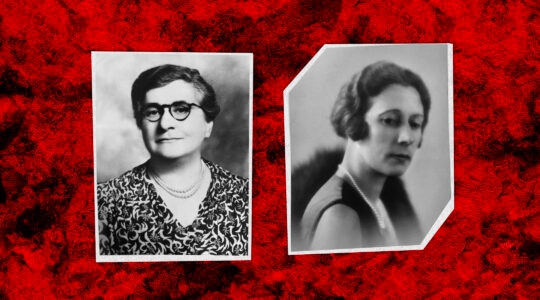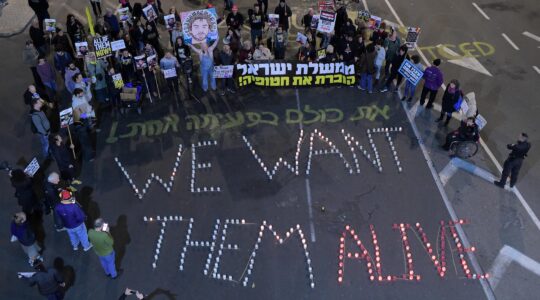When I was a teenager in yeshiva in Baltimore, Purim was a time for pushing the boundaries — and finding them more open than expected.
It was the one night of the year to experiment with smoking cigarettes, consuming alcohol and making fun of teachers, all in the public eye, at school, with no parents around. And the adults not only didn’t mind our behavior, they often encouraged us, especially when it came to pouring a cup of “mashke,” or whiskey. On Purim, anything goes, or at least it did back then, in keeping with the spirit of the times of pre-political correctness (and parental concern, apparently). Our behavior was also in the spirit of the holiday, which not only celebrated the Jews ofPersia’s victory over the evil Haman, who sought their destruction, but the manner in which that sweet triumph was achieved.
The Hebrew phrase is v’nihapichu, which in essence means, everything was turned inside out, namely the powerful viceroy of the empire, Haman, was laid low by the very Jew he sought to bring down, Mordechai. And earlier in the story Mordechai was paraded through the streets of Shushan, on orders of the king, by Haman, who designed the celebration thinking it was for himself.
There are so many ironic twists and near tragic turns in the Book of Esther that the story comes alive each year with the reading of the Megillah, in its unique cantillation. And somehow, the very rabbis who taught us in school to revere the holy books and the sages who understood them, laughed aloud and seemed to appreciate our Purim spiels, or plays, knowing full well they themselves were the characters we were mimicking or mocking. But it was OK on Purim, and even some of the rabbis got into the act, offering up examples of Purim Torah, poking fun at the logic of the Talmud.
I remember one rabbi who posited that Pharaoh should have been considered a great hero. Why? he asked. Because, he said, Moses was considered a great man and he killed only one man (the Egyptian taskmaster whom he saw beating a Jew), so according to that way of thinking, Pharaoh should be exalted because he killed many people.
Maybe you had to have been there, but it was funny at the time, and exhilarating to see our often quiet, serious rebbes getting into the Purim spirit, bonding with us like at no other time of the year.
Serious students imbibed, and fringe students took part in the spirited male circle dancing, with everyone switching their normal roles — just like in the Purim story.
This was the holiday, after all, of adloyodah, of the tradition of becoming so involved with celebration that one would not know the difference between Haman the Evil and Mordechai the Jewish Hero. Perhaps the sages meant for that celebration to be on a deep spiritual plane, but in fact it took place through a different type of spirits — the kind you drink. And Purim was for initiating the innocents, and for cleaning up the mess in the morning.
Times have changed in so many ways, and fortunately there is far more concern today about the very real dangers of drinking. But in the world of yeshivas, I suspect there are still plenty of first-time hangovers on Purim morning.
Several years later, when I was a student at Yeshiva University, several of us decided that while the YU Purim party was extremely lively, we wanted a new and different experience. One of our circle had heard that the most amazing Purim celebrations were in Brooklyn, and set out to lead us on a subterranean journey along unfamiliar subways, streets and boulevards.
He had the most to drink that night, perhaps in preparation for our travels, and I still recall his blurry reading of the Hebrew words engraved on an imposing synagogue in the neighborhood, as he called out in a questioning voice the name of the congregation of “Devorah Fork”?
It was “Boro Park,” of course, but he was too far gone to care — or to ever find the pulsating and electric celebrations he promised.
Instead, as we ventured from one quiet synagogue to the next, asking where the action was, the answer was always the same: “The young people? They all went to Yeshiva University.”
I’ve never been a drinker, Purim included. My preferred style of rebellion has been attempting the sly, subversive humor that I first discovered on Purim all those years ago when we were given permission to take on the sacred cows, if only for a day.
It’s carried over to the annual Jewish Week Purim Spoof, whose subject matter from year to year tends to focus disproportionately on the observant community, and its customs and rituals. But its members tend to have the thickest skin, at least on this holiday, understanding the roots and tradition from whence it comes and the loving spirit with which it is intended. At least, let’s hope so.
Happy Purim.
The New York Jewish Week brings you the stories behind the headlines, keeping you connected to Jewish life in New York. Help sustain the reporting you trust by donating today.





